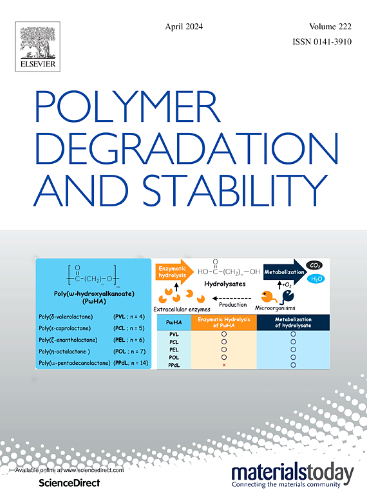Thermo-oxidative degradation behavior of vulcanized butadiene rubber under thermal recycling conditions
IF 6.3
2区 化学
Q1 POLYMER SCIENCE
引用次数: 0
Abstract
Thermo-oxidative reclamation of tire rubber has been proven to be an energy-efficient method for upcycling end-of-life tire. As one of the key components, the complicated oxidative degradation behavior of butadiene rubber (BR) has significantly hindered the reclamation efficiency of tire rubber. This study investigated the thermo-oxidative degradation behavior of vulcanized BR in the temperature range (180–240 °C) typically used for reclamation. The influence of oxygen diffusion on the degradation evolution of vulcanized BR was investigated using stacked sheet samples, by characterization of their chemical structure, network structure and mechanical properties during the degradation processes. The chemical structure changes indicated that increased surface oxidation led to more pronounced heterogeneous oxidative distribution within the stack. The different layers exhibited distinct degradation changes due to the competition among chain scission and recombination of rubber network structures in degraded BR. The depth profiles monitored by atomic force microscopy (AFM) observed a high-degree oxidized layer with newly crosslinked structures formed at the stacked sample surface, which was the main cause leading to the heterogeneous oxidative degradation. Additionally, the degradation degree of vulcanized BR was analyzed across different temperatures, with the highest degree of degradation was achieved at 210 °C in 20 min.
求助全文
约1分钟内获得全文
求助全文
来源期刊

Polymer Degradation and Stability
化学-高分子科学
CiteScore
10.10
自引率
10.20%
发文量
325
审稿时长
23 days
期刊介绍:
Polymer Degradation and Stability deals with the degradation reactions and their control which are a major preoccupation of practitioners of the many and diverse aspects of modern polymer technology.
Deteriorative reactions occur during processing, when polymers are subjected to heat, oxygen and mechanical stress, and during the useful life of the materials when oxygen and sunlight are the most important degradative agencies. In more specialised applications, degradation may be induced by high energy radiation, ozone, atmospheric pollutants, mechanical stress, biological action, hydrolysis and many other influences. The mechanisms of these reactions and stabilisation processes must be understood if the technology and application of polymers are to continue to advance. The reporting of investigations of this kind is therefore a major function of this journal.
However there are also new developments in polymer technology in which degradation processes find positive applications. For example, photodegradable plastics are now available, the recycling of polymeric products will become increasingly important, degradation and combustion studies are involved in the definition of the fire hazards which are associated with polymeric materials and the microelectronics industry is vitally dependent upon polymer degradation in the manufacture of its circuitry. Polymer properties may also be improved by processes like curing and grafting, the chemistry of which can be closely related to that which causes physical deterioration in other circumstances.
 求助内容:
求助内容: 应助结果提醒方式:
应助结果提醒方式:


